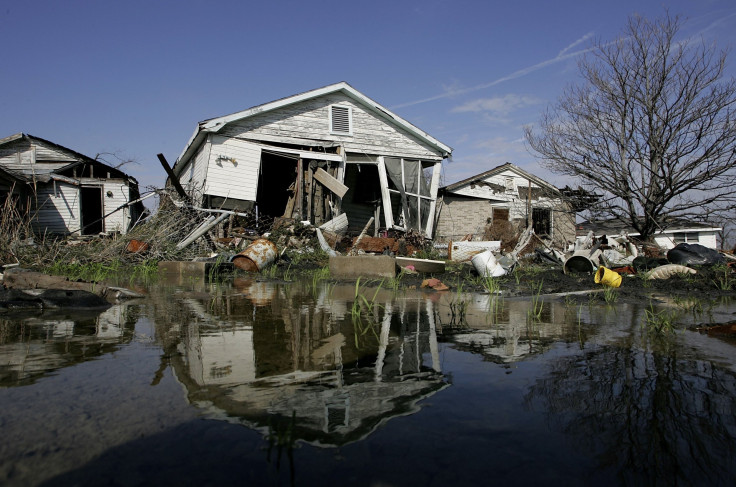10 Years After Katrina, New Remedies - And Compliance Crackdowns - In Louisiana's Home Rebuilding Program

On Monday, less than a week before the 10th anniversary of Hurricane Katrina, Louisiana announced new administrative remedies for thousands of people who received grant money from the state’s ambitious post-Katrina Road Home housing-rebuilding program but still haven’t returned home a decade after the historic storm. The announcement was cheered by housing activists who have long petitioned to make it easier for Road Home participants to access funding and comply with program rules. But the state also announced it will aggressively work to recover Road Home money from those it deems noncompliant, a promise that could lead to additional turbulence for a program beset by criticism and controversy from the start.
Billed as the largest housing aid program in American history, Louisiana launched the Road Home rebuilding program in 2006 to help thousands of homeowners rebuild or sell homes damaged by Hurricanes Katrina and Rita. Nine years later, the program has distributed more than $9 billion in federal funds to 130,000 homeowners to reconstruct their homes or buy new ones, with the vast majority choosing to rebuild and following through on the plan. But according to the state, approximately 6,000 homeowners who accepted Road Home funding to fix their homes, roughly 6 percent of the total, haven’t yet rebuilt, and another 16,000 who received money to elevate their homes to protect them from floodwaters but haven’t yet done so.
The new program changes, developed by Louisiana’s Office of Community Development (OCD) and the federal Department of Housing and Urban Development (HUD), are designed to help bring these final holdouts home, and it’s no coincidence the initiatives arrived right before Katrina’s anniversary. “We’ve been working hard on it for months with HUD collaboration,” said Pat Forbes, director of OCD, which oversees Road Home. “We certainly didn’t hold it for this week; we just made sure we got it out this week.”
Among the changes announced for Road Home:
- Louisiana aims to use the $30 million in remaining unobligated Road Home funds, plus additional funding programs, to help make up the difference for those who haven’t still received sufficient money to repair and/or elevate their homes as required.
- The state plans to reimburse up to two years of housing costs for those who spent Road Home funding on living expenses while they waited to rebuild, leaving them without enough to finish the job.
- Road Home staffers will now be able to conduct verification inspections for those who used home elevation grants to cover home repair costs but haven’t been able to produce receipts necessary to reclassify these elevations monies as rebuilding funds.
- Homeowners who opted to rebuild their homes but have been unable or unwilling to do so will now have additional methods to instead sell their property to local jurisdictions.
This isn’t the first time administrators have attempted to retool Road Home. But Forbes is optimistic that these new changes will be especially beneficial. “[These] are things we know from conversations with housing advocacy groups and others close to homeowners that are big pieces of what’s keeping people from being able to return home,” he said.
Housing advocates, many of whom have been critical over the years of delays and red tape that have plagued Road Home, applauded the state’s announcement. “I am delighted,” said M.A. Sheehan, director of the Lower 9th Ward Homeownership Association’s House the 9 Program. “I think both HUD and OCD have done a great job addressing most of the issues we've been seeing. Obviously, implementation will take a little while, and we have to make sure it's done right, but the policies themselves will give us what we need to work with.”
Louisiana’s plan to start recovering Road Home funds from those who still don’t meet their Road Home rebuilding or elevation obligations, even with these new remedies, might not be met with the same fanfare. “It’s really more of a reiteration of our recovery processes that have been in place for years,” says Forbes. “As we have been working to get to this last set of tools to help people get home, it didn’t make sense to go out and aggressively implement the recovery process with people who may be able to avail themselves of these new tools.”
Sheehan, for one, understands why retrieving incorrectly used Road Funds is neccesary. “I think that’s really part of the state's job to do that, so I don't think there's any getting around that,” she said. “I just hope that process of trying to recapture funds from people who didn't complete their rebuildng or elevation is conducted in a way that recognizes the trauama that they have been through and all of the challenges they have faced in trying to comply with the covenents to rebuild or elevate.”
For others, Road Home has become so synonymous with official mismanagement that they question whether these new remedies will have their intended effect. “This all sounds great, but implementation is key,” said Vanessa Gueringer, a community activist in the Lower Ninth Ward who spent years wrangling with the Road Home administrators to obtain enough funding to rebuild her house and that of her 100-year-old mother. “As a person who knows of all the struggles folks have had in my community, I am somewhat pessimistic that these funds will reach us.”
Forbes insists the funds will reach those who need it most, and as a result, all those still waiting to rebuild will likely do so in the next two or three years.
After that, the road home might finally be complete.
© Copyright IBTimes 2024. All rights reserved.






















